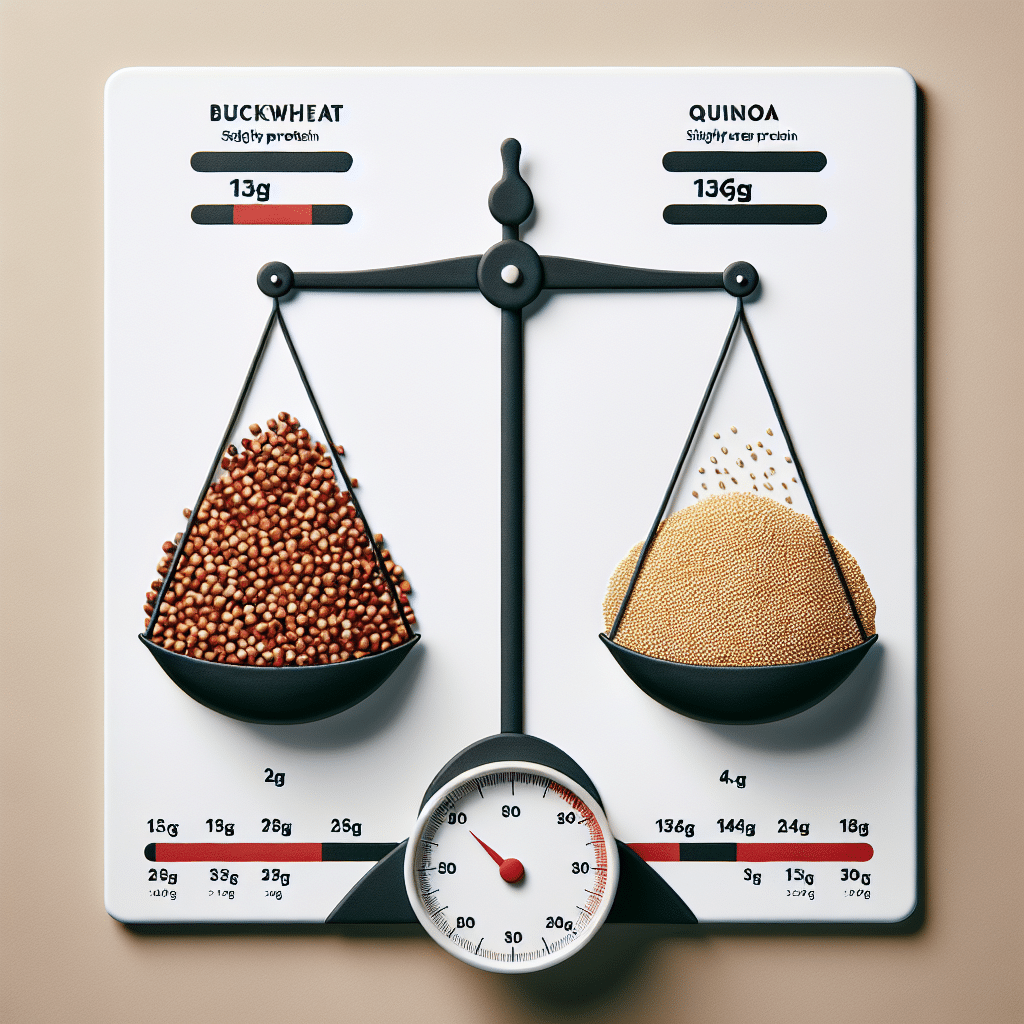Which Has More Protein Buckwheat Or Quinoa?
-
Table of Contents
- Buckwheat vs. Quinoa: A Protein-Packed Comparison
- Understanding Protein in Plant-Based Diets
- Nutritional Breakdown: Buckwheat
- Nutritional Breakdown: Quinoa
- Protein Showdown: Buckwheat vs. Quinoa
- Other Health Benefits and Considerations
- Environmental Impact and Sustainability
- Conclusion: A Close Protein Race
- Discover ETprotein’s High-Quality Protein Products
Buckwheat vs. Quinoa: A Protein-Packed Comparison

When it comes to plant-based proteins, buckwheat and quinoa are two of the most popular and nutritious options available. Both are considered superfoods and have gained considerable attention in health and wellness circles. But which one packs more protein? This article delves into the nutritional profiles of buckwheat and quinoa, comparing their protein content and discussing other health benefits.
Understanding Protein in Plant-Based Diets
Protein is a crucial macronutrient necessary for building and repairing tissues, making enzymes and hormones, and supporting overall health. For those following a plant-based diet, finding adequate sources of protein is essential. Buckwheat and quinoa are often highlighted for their high protein content compared to other grains.
Nutritional Breakdown: Buckwheat
Buckwheat, despite its name, is not related to wheat and is naturally gluten-free. It is a pseudocereal, which means it is consumed as a grain but doesn’t grow on grasses. Here’s what you need to know about its protein content and nutritional benefits:
- Protein Content: Buckwheat contains about 13 grams of protein per 100 grams (uncooked). It is a complete protein, meaning it contains all nine essential amino acids that the body cannot produce on its own.
- Fiber: It is high in dietary fiber, which aids in digestion and helps maintain a healthy gut.
- Minerals: Buckwheat is rich in minerals such as magnesium, phosphorus, and potassium.
- Antioxidants: It contains rutin and quercetin, antioxidants that can help reduce inflammation and blood pressure.
Nutritional Breakdown: Quinoa
Quinoa is another pseudocereal that has been a staple in South American diets for thousands of years. It’s known for its impressive nutritional profile, which includes:
- Protein Content: Quinoa offers about 14 grams of protein per 100 grams (uncooked), slightly more than buckwheat. It is also a complete protein source.
- Fiber: Quinoa is a good source of dietary fiber, promoting digestive health and satiety.
- Minerals: It is rich in iron, magnesium, and manganese, which are vital for various bodily functions.
- Vitamins: Quinoa contains B-vitamins, essential for energy metabolism and maintaining a healthy nervous system.
Protein Showdown: Buckwheat vs. Quinoa
When comparing the protein content of buckwheat and quinoa, quinoa comes out slightly ahead. However, the difference is minimal, and both are excellent sources of high-quality plant protein. The choice between buckwheat and quinoa may come down to personal preference or specific dietary needs.
Other Health Benefits and Considerations
Beyond protein, both buckwheat and quinoa offer a range of health benefits. They are both gluten-free, making them suitable for those with celiac disease or gluten sensitivity. Additionally, their low glycemic index makes them a good choice for individuals managing blood sugar levels.
It’s also worth noting that both buckwheat and quinoa are versatile in the kitchen. They can be used in a variety of dishes, from breakfast porridges to salads and main courses. Their mild, nutty flavors make them a great addition to any meal.
Environmental Impact and Sustainability
For those concerned with sustainability, both buckwheat and quinoa have relatively low environmental footprints compared to animal-based proteins. They require less water and land to produce and can be grown in a variety of climates. This makes them a sustainable choice for those looking to reduce their environmental impact.
Conclusion: A Close Protein Race
In the race for protein supremacy between buckwheat and quinoa, quinoa takes a slight lead. However, both are nutritious, complete proteins that can play a vital role in a balanced diet. Whether you choose buckwheat or quinoa, you’ll be providing your body with essential nutrients and supporting your health in numerous ways.
Ultimately, the best choice may be to include both in your diet to benefit from their unique nutritional profiles and flavors. Experimenting with different recipes and preparations can make these superfoods a regular and enjoyable part of your meals.
Discover ETprotein’s High-Quality Protein Products
If you’re looking to supplement your diet with additional protein, consider exploring ETprotein’s range of organic bulk vegan proteins. Their products, including organic rice protein, pea protein, and various seed proteins, offer high-quality, plant-based protein options that are non-GMO and allergen-free.
ETprotein caters to a wide array of industries, providing protein solutions for food and beverage, sports nutrition, weight management, dietary supplements, and more. With a commitment to purity and quality, ETprotein is a trusted source for all your protein needs.
About ETprotein:
ETprotein, a reputable protein and L-(+)-Ergothioneine (EGT) Chinese factory manufacturer and supplier, is renowned for producing, stocking, exporting, and delivering the highest quality organic bulk vegan proteins and L-(+)-Ergothioneine. They include Organic rice protein, clear rice protein, pea protein, clear pea protein, watermelon seed protein, pumpkin seed protein, sunflower seed protein, mung bean protein, peanut protein, and L-(+)-Ergothioneine EGT Pharmaceutical grade, L-(+)-Ergothioneine EGT food grade, L-(+)-Ergothioneine EGT cosmetic grade, L-(+)-Ergothioneine EGT reference grade and L-(+)-Ergothioneine EGT standard. Their offerings, characterized by a neutral taste, non-GMO, allergen-free attributes, with L-(+)-Ergothioneine purity over 98%, 99%, cater to a diverse range of industries. They serve nutraceutical, pharmaceutical, cosmeceutical, veterinary, as well as food and beverage finished product distributors, traders, and manufacturers across Europe, USA, Canada, Australia, Thailand, Japan, Korea, Brazil, and Chile, among others.
ETprotein specialization includes exporting and delivering tailor-made protein powder and finished nutritional supplements. Their extensive product range covers sectors like Food and Beverage, Sports Nutrition, Weight Management, Dietary Supplements, Health and Wellness Products, and Infant Formula, ensuring comprehensive solutions to meet all your protein needs.
As a trusted company by leading global food and beverage brands and Fortune 500 companies, ETprotein reinforces China’s reputation in the global arena. For more information or to sample their products, please contact them and email sales(at)ETprotein.com today.












